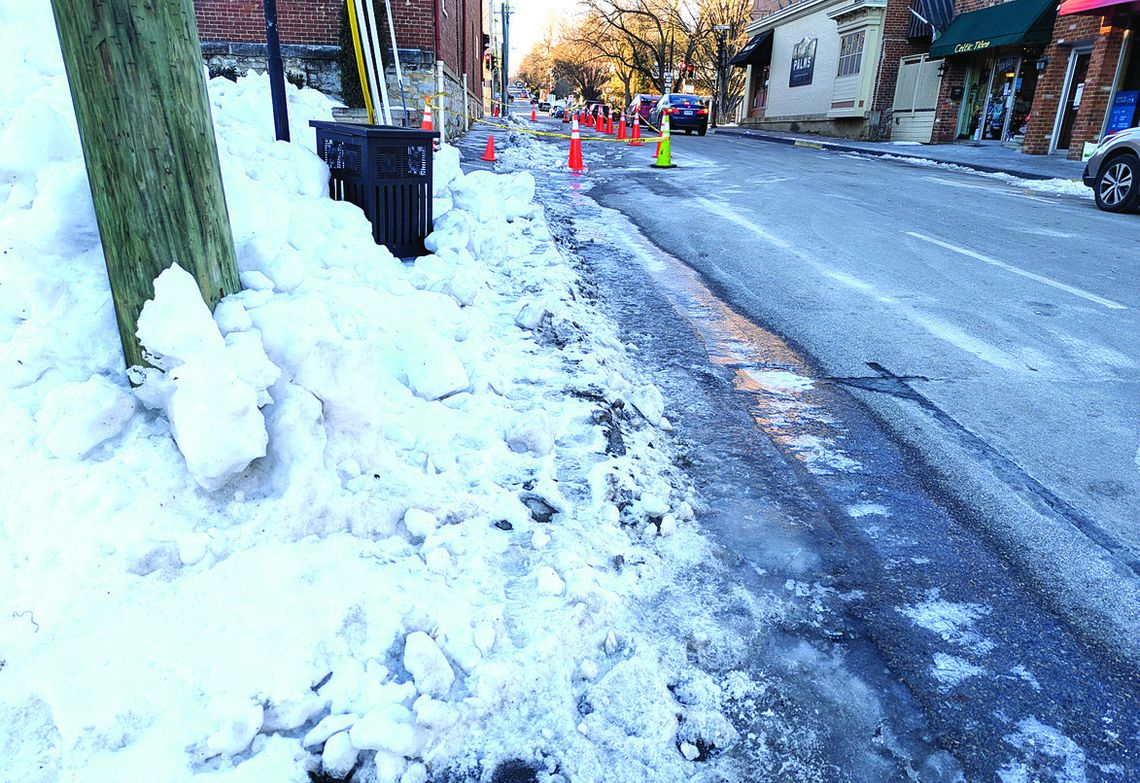Editorial
Having gone a couple of years without any significant snow accumulation, most of us have enjoyed the winter wonderland that has surrounded us for the past week-and-a-half.
Several inches of snow followed by sleet and freezing rain the Sunday before last created this scenic beauty. A sustained period of freezing temperatures, plus a couple of inches of fresh snow on Friday night, has allowed us to behold these lovely views for longer than we’re accustomed.
This extended stretch of winter weather has, of course, played havoc with our routines and scheduled activities. Rockbridge County and Buena Vista schools were closed all last week, with students and teachers not returning from their holiday breaks until Monday, when both divisions resumed classes with a twohour delay. Lexington city students returned Thursday with a two-hour delay. All of the scheduled high school sporting events were either postponed or cancelled last week.
Necessitating these disruptions, the snowy and icy conditions have posed hazards for many, especially the older adults among us. Carilion Clinic, which owns and operates Carilion Rockbridge Community Hospital in Lexington, shared with us ways for how we can weather these seasonal hazards.
“Winter months don’t just bring snow days; there is always an uptick in injuries during periods of winter weather,” said Ottilia Lewis, trauma outreach and injury prevention coordinator at Carilion Roanoke Memorial Hospital. “We see patients come in for slipping on ice, hypothermia or motor vehicle collisions because of icy roads.”
Lewis advises everyone who ventures outside in these unusually frigid temperatures to “layer up: wear layers to trap body heat and adjust as needed. Focus on covering areas with a high amount of heat loss like your head, hands and feet. Choose the right fabrics: Opt for fabrics that wick moisture away from the body as well as thermal options for layers. That will keep you warmer by holding in your body heat and removing chilly moisture. Avoid cotton -- it retains moisture and steals body heat.”
It’s always good to plan ahead, she says. “Pack a winter kit: keep essentials like food, water, blankets and extra clothing in your car. This allows you to hunker down safely if the roads become too messy for travel. Add sturdy shoes in case you need to walk for help.” Stay home, if possible. “The majority of winter injuries occur when people go outside or try to stick with their usual routines. Falls on ice can happen even just in your driveway. So unless you absolutely have to leave, it’s better to stay home and weather the storm in place.”
Be prepared for power outages, she notes. “Make sure you have a plan if there is a power outage. This could be something as simple as having sufficient fuel in your car -- this gives you a way to charge your devices or any other equipment you need.”
She advises those who’ve been outside for an extended period of time to be on the lookout for hypothermia. “Many may anticipate the risk of hypothermia when there is snow on the ground, but hypothermia is a risk even at 50 degrees. Hypothermia can be lifethreatening. Look for these early signs, often called the ‘umbles’: mumbling (slurred speech), stumbling (difficulty walking), fumbling (trouble with fine motor skills)” If you notice these symptoms in yourself or someone else, she says, “Warm up gradually: Use blankets and warm beverages, and stay indoors for the rest of the day. Avoid direct heat like hot water -- it can make things worse. Seek medical attention if symptoms continue.”
Lewis suggests checking on friends, family and neighbors regularly. “Cold weather can be dangerous, especially for older individuals or those with chronic health conditions. Make sure they have enough supplies and the ability to keep warm. A lot of our elderly patients are on a fixed income and may not be able to heat their homes the way others can. Make sure they have enough warmth and supplies” As for clearing sidewalks and walkways, those who can shovel snow should help those who can’t. Everyone should avoid overexerting themselves, as this can lead to injuries or heart strain. If a medical emergency arises, seek help or call 911. We commend our first responders for being there when we need them.
Enjoy the snow. But be smart by following these words of wisdom from Lewis, who has more than a decade of experience working in trauma care.



